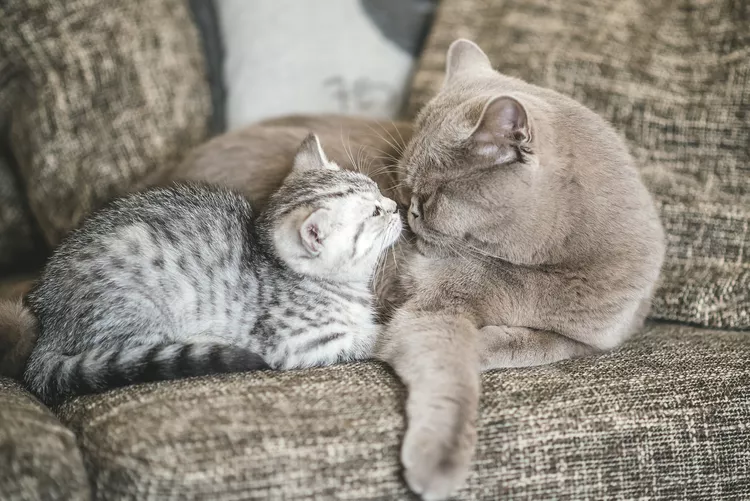Leptospirosis in Cats

Although rare, cats can contract leptospirosis, a bacterial infection usually found in still, contaminated water. Leptospirosis is most commonly transmitted when cats drink water infected with diseased urine or eat an infected animal. Cats don't always show symptoms, but they are either non-specific or related to kidney damage when they do. Symptoms include vomiting, fever, and increased thirst. Your vet will diagnose leptospirosis by performing a physical examination and tests. Leptospirosis is zoonotic, meaning humans can contract the disease, so it's essential to be very careful around an infected cat.
What Is Leptospirosis?
Leptospirosis is a zoonotic bacterial infection that can damage the nervous system, reproductive system, eyes, liver, and kidney through the causative bacteria Leptospira. Leptospirosis is commonly transmitted when eats an infected rat or drinks infected urine, most commonly found in still, surface water in humid environments. Cats can generally produce enough antibodies to fight the disease, but some cases of leptospirosis can be fatal if untreated.
Symptoms of Leptospirosis in Cats
Cats don't always present symptoms of leptospirosis, but when they do, the symptoms are wide-ranging and highly dependent on the strength of your cat's immune system. Cats are less likely to show signs of leptospirosis than other animals infected with the disease.
If your cat has a weak or compromised immune system, it will likely show symptoms of leptospirosis. Symptoms are usually relative to the damage leptospirosis has caused to your cat's organs. For example, symptoms of kidney dysfunction like increased thirst will be present in a cat with a kidney impacted by leptospirosis. Non-specific symptoms like vomiting, diarrhea, and weight loss may also occur. If you suspect your cat is sick, especially with symptoms related to kidney failure, visit your vet.
What Causes Leptospirosis in Cats?
There are multiple ways for your cat to contract leptospirosis.
- Contaminated urine and water: Cats most commonly contract leptospirosis through still water contaminated with another animal's infected urine. A cat can also get leptospirosis by coming into contact with infected water, even without drinking it, as the bacteria can enter the body by burrowing into the skin. It's more common, however, for cats to contract leptospirosis by drinking due to their aversion to bathing.
- Animal contact: Cats most often contact leptospirosis by eating or biting infected animals, particularly rodents. Rats are principal carriers of the Leptospira bacteria. For example, in France, 44% of rats were found to carry Leptospira. Cohabitating dogs may also transmit the disease to cats.
- Tropical climate: Leptospira thrives in moist, tropical environments. The risk of developing leptospirosis is higher for cats who live in warm climates.
How Vets Diagnose Leptospirosis in Cats
Cats are not routinely tested for leptospirosis. But if you notice your cat showing symptoms of kidney disease, your vet may consider leptospirosis as a cause, especially if your cat has had recent exposure to marshy or heavily wooded areas. In addition to a full physical exam, your vet will perform blood analysis, urinalysis, and antibody tests to diagnose your cat with leptospirosis.
How to Treat Leptospirosis in Cats
Cats diagnosed with leptospirosis will usually begin treatment with an antibiotic like doxycycline. Your cat may also receive IV fluids for dehydration, blood transfusion, and other medications to manage symptoms like vomiting and diarrhea.
If your cat has also been diagnosed with kidney damage due to leptospirosis, additional, more comprehensive treatment will be necessary. Your vet may prescribe a special diet to restrict phosphorus and protein levels and supplements like fish oil to improve kidney function. Your veterinarian will continue to monitor your cat's kidney enzyme blood levels with regular blood work. Kidney disease caused by leptospirosis is chronic, so the goal of treatment is to slow progression, decrease the stress placed on the kidneys, and minimize symptoms to improve your cat's quality of life.
Prognosis for Cats With Leptospirosis
If leptospirosis has not spread to your cat's vital organs, the prognosis is good, and treatment with antibiotics is effective. If your cat has suffered kidney disease, the prognosis is relative to its severity.
How to Prevent Leptospirosis in Cats
Since there is not a widely available vaccine for leptospirosis in cats, the best preventative measures are to keep your cat indoors, away from potential sources of infection (such as still water) and control the rodent population around your cat. If you have a multi-animal household, you must quarantine your infected cat. Indoor cats are at a much lower risk of contracting the disease than outdoor cats.
Is Leptospirosis Contagious to Humans?
Leptospirosis is zoonotic, meaning it is contagious to humans. People with compromised immune systems are especially susceptible to contracting leptospirosis and should be highly cautious when caring for a cat with the disease. Anywhere your cat may have excreted fluid must be thoroughly disinfected while wearing gloves. Even if you're not showing symptoms, it's worthwhile for you and other members of your household to get tested if you have been exposed to leptospirosis.
-
How do most cats get leptospirosis?
While Leptospira is most common in standing, contaminated water, most cats contract the disease through biting or eating an infected animal, such as a rat.
-
Is leptospirosis common in cats?
Cats can contract leptospirosis, but it is more common in other animals, like dogs.
-
Can my cat give me leptospirosis?
Cats can give their owners leptospirosis, so consult a vet for the best preventative measures you can take against your infection if your cat has the disease.